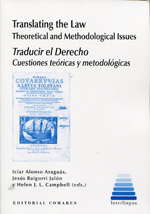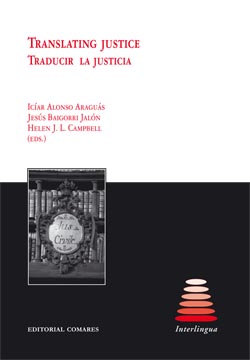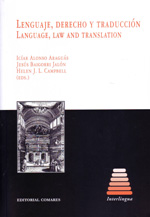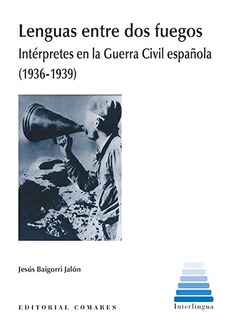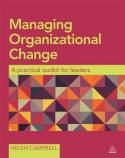Traslating the Law = Traducir el Derecho
theoretical and methodological issues = cuestiones teóricas y metodológicas
- ISBN: 9788490450369
- Editorial: Editorial Comares
- Fecha de la edición: 2013
- Lugar de la edición: Granada. España
- Colección: Interlingua
- Encuadernación: Rústica
- Medidas: 22 cm
- Nº Pág.: 103
- Idiomas: Español; Inglés

Servicio de búsqueda de libros
Este libro está agotado o descatalogado por la editorial. Si lo desea podemos buscar esta obra en librerías de saldo y ocasión.
Sí, por favor búsquenme este libroSalamanca, the model, is now a concept. It is a training seminar for professional linguists but much more than this, it is a different approach to learning and exchanging experience, one which has proved its worth for five consecutive years, becoming richer and more innovative with each passing year. Where did it originate and why, what made it the success it has become? The ingredients are simple. Take three worlds: academia, professional life in an international organisation and university studies. Perhaps one could add one more, that of vocational training. Blend for a week at room temperature. Hey presto, a successful seminar! There is, of course, far more to it than that, but the basic ingredients are these. What we have done with them and how we have blended and tended them is a rather longer story.
Today in 2013 communication is more important than ever, across borders and well beyond the confines of Europe. Leisure travel and retirement schemes, as well as moving elsewhere to find employment, have already changed how we live. In addition, immigration and asylum, conflicts and wars, economic hardship, high unemployment and a sudden change of fortunes in the last five years have led to a massive demographic shift, as people migrate to another country, in search of new opportunities and a better life. In so doing they need not just the motivation to move but also the wherewithal, the skills, the ability to adapt, perhaps to master a new language and a new legal situation. Laws must be understood wherever a person goes to find work, to set up a business, to seek a job, to visit new places or to settle in a new environment. Most of all, these migrants, be they temporarily or permanently in a new country, need to be able to communicate, to speak, write and survive in a different language, a different culture and country, within a different set of laws governing their private and professional lives.
These realities have highlighted the vital importance of legal translation and interpretation and the need for every individual to be protected by the law of the land he or she chooses to live in regardless of language, religion or cultural background. More and more, courts of law and tribunals, national and international, are faced with the realities of multilingualism, and nowhere is this more clearly demonstrated than in the European Directive 2010/64/EU on the right to interpretation and translation in criminal proceedings, adopted in 2010 and this year in force in all European Union Member States. Some countries have been more rapid than others in implementing this crucial Directive but it is now law in all of them, i.e. directly applicable and a reality that nation?al Ministries and Courts must observe. Public Service Translation and Interpretation (the generic name most often used) has for too long been viewed as the ?poor relative? of conference interpreting and translation in international organisations. The existence of a National Register of Public Service interpreters and translators is now seen as an urgent need where it has not yet been introduced and as a great asset where it has, despite the refusal of some EU members to grasp the importance of proper training for such practitioners and of a qualification such as the Chartered Institute of Linguists diploma in Public Service Interpreting in the United Kingdom. Such a quality indicator is vital if the Ministries of Justice, the courts and tribunals are to recruit linguists who are reliable and will perform their tasks professionally and objectively. There is still much to be done in terms of awareness raising of clients, end-users, e.g. Ministries and the private and public sectors, to guarantee justice for all, whatever their origins or linguistic abilities. Public Service also implies translation and interpretation in other key areas such as the Police, immigration and asylum offices and just as importantly, local administration and health care. In all of these areas, crucial to the everyday lives of us all, provision of well-trained and qualified translators and interpreters where needed is not just a useful adjunct but an absolute necessity and a fundamental right.
In general, and now more than ever, students contemplating their futures must consider the options open to them and choose the right path, surely involving, to a greater or lesser extent, the mastery of another language and an understanding of the law. These can no longer be seen as special subjects, but rather as economic and practical necessities.
Universities have always been and remain centres of excellence, of history, research, study and exchange among scholars, but also of transferring skills and practical knowledge in this century. Students may wish to follow an academic career, or else to spend a part of their lives in an academic world, to learn and be enriched before embarking on the long and winding road to earning a living and making a life for themselves and their families. But they will also be looking increasingly for studies that will enable them to find reward?ing and challenging work. In other words, the gap

